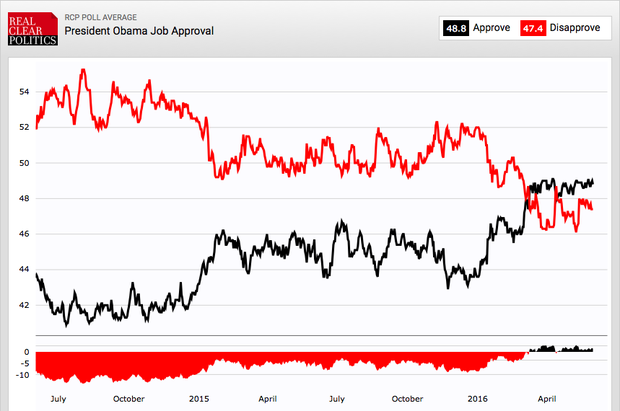2016 by the numbers: Obama's rising ratings a boon for Hillary Clinton?
As polls show Hillary Clinton's lead over Donald Trump whittled down to the slimmest of margins, could Clinton find herself relying on President Obama to drag her across the finish line on Election Day?
The president will visit Elkhart, Indiana on Wednesday to take a victory lap of sorts, touting the progress the U.S. economy has made under his presidency and rallying voters behind Democratic policies ahead of the election in November. Unemployment is down and health coverage is up, he'll tell voters - why would you put the other team in charge now?
It's a sales pitch that could carry some extra legitimacy, given the president's rising approval ratings - in the latest CBS News/New York Times poll, 50 percent of respondents said they approve of the job Mr. Obama is doing. 43 percent said they disapprove. A year ago, those numbers were roughly reversed: 48 percent disapproved, and only 42 percent approved.
That upswing is also reflected in other recent polls: The latest Gallup survey puts Mr. Obama's approval rating at 52 percent, and his disapproval at 44 percent. A recent NBC News/Wall Street Journal poll put those numbers at 51 percent and 46 percent, respectively.
That could be good news for Clinton, the likely Democratic nominee, and other Democrats on the ballot in November. It's historically been difficult for an outgoing president's party to hold onto the White House if that president is saddled with poor approval ratings - Just ask 2008 Republican nominee John McCain or 1968 Democratic nominee Hubert Humphrey.
The opposite is also, true, however: A popular outgoing president can do a lot to help his party's candidates win. George H.W. Bush, for example, was able to capture the presidency fairly easily in 1988 running as the heir to Ronald Reagan.
The 2000 election was an interesting case: Al Gore, the Democratic candidate, made a decision to distance himself from the incumbent, Bill Clinton, who had high job approval ratings but had been tarnished by the Monica Lewinsky scandal in his second term. Gore actually won the popular vote that year, but he lost the Electoral College and the presidency. Many analysts believe he made a mistake in sidelining Clinton, rather than fully embracing the incumbent's legacy.
If Clinton's posture thus far has been any indication, she won't make the same mistake: She's tethered herself, closely and repeatedly, to Mr. Obama to fend off attacks from both Bernie Sanders and Donald Trump. On immigration, taxes, climate change, and other issues, Clinton has presented herself as the person best prepared to build on the foundation put in place by Mr. Obama.
Only time will tell whether her decision to go all-in on the heir-apparent strategy was the correct one. But if the president's approval ratings continue climbing, she'll have reason to be optimistic.
New general election polls
Some new polls of a Clinton vs. Trump election show the race has mostly settled since Trump's surge after clinching the nomination last month - it's a close matchup, with perhaps a slight advantage for Clinton.
A Quinnipiac survey released Tuesday found Clinton at 45 percent and Trump at 41 percent nationwide. When third-party candidates Gary Johnson (the Libertarian nominee) and Jill Stein (the Green Party nominee) were included, the race tightened: Clinton had 40 percent, Trump was at 38 percent, Johnson was at 5 percent, and Stein was at 3 percent.
In the latest CBS News survey, for comparison, Clinton was up 47 to 41 percent over Trump nationwide.
Some recent swing state polls also show Clinton with a slim lead. A Detroit News/WDIV-TV poll this week found the former secretary of state winning 43 to 39 percent in Michigan. And a Gravis poll of Virginia voters last week found Clinton ahead of Trump, 45 to 41 percent. But a Roanoke College poll from last week found the race in Virginia tied, with both candidates at 38 percent.
The end of the primary calendar
With the exception of the Democratic primary in Washington, D.C. on June 14, the primary calendar will come to an end next week when California, New Jersey, and a handful of other states vote on June 7. And a week out, it looks like we're headed for a predictable finish.
On the Republican side, Trump has already surpassed the 1,237 delegates needed to win his party's nomination, and he's expected to add to that total in the final contests.
On the Democratic side, Clinton is nearly within reach of her party's nomination. She currently has 2,312 total delegates, including super delegates, who are not bound by the results of their states' primaries. Clinton needs just 71 more delegates - or 8 percent of all the remaining delegates - to reach the 2,383 she needs to clinch the nomination. Sanders, who has only 1,539 delegates, would need to win 92 percent of all remaining delegates - super and pledged - to reach 2,383.
The Vermont senator has said he still believes he can win a majority of pledged delegates by the end of the primary season, and then persuade super-delegates to swing behind his candidacy. But even that seems nearly impossible: Clinton currently has 1,769 pledged delegates, and she'd need only 257 more to obtain a majority - about 33 percent of those remaining. Sanders, who has only 1,495 pledged delegates, would need to win 531 pledged delegates - or about 67 percent of those remaining - to emerge with a majority.
To date, Clinton has won 54 percent of pledged delegates, while Sanders has won about 46 percent.
